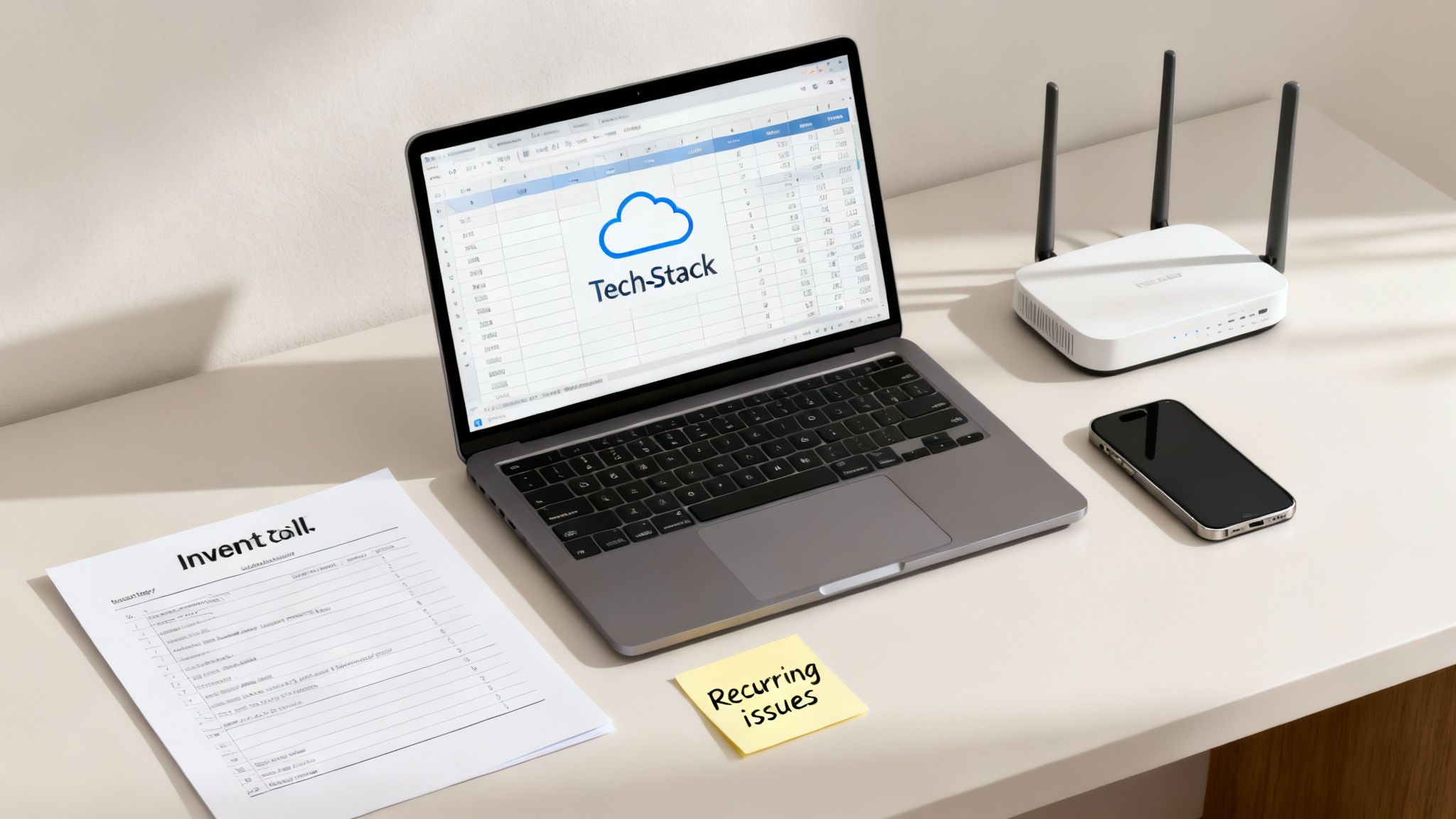When your business network goes down, everything stops. That sudden silence isn't just an inconvenience; it's a direct hit to your bottom line. Finding reliable computer network support near me isn’t something you do when you have time—it's a fundamental decision that keeps your business alive when tech problems inevitably happen.
Why Local Network Support Is a Game Changer

Think about it. A retail shop’s payment system crashes during the holiday rush. A busy dental office suddenly can't access patient records because the server failed. These aren't just worst-case scenarios; they're expensive realities that can bring a business to its knees. Downtime means more than lost sales—it erodes customer trust and tanks employee morale.
This is precisely where having a local IT partner proves its worth.
Having an expert right around the corner gives you a response time that remote-only support just can't touch. Sure, many software glitches can be fixed from afar, but what about when a critical piece of hardware gives out? A local technician can be at your door in a flash, ready to diagnose the issue and get you back up and running with minimal disruption.
The Personal Touch of a Local Partner
A nearby support team brings more to the table than just quick on-site visits. They get to know the local business environment and, more importantly, they get to know you.
This familiarity allows them to offer advice and solutions that actually fit your specific challenges, not some one-size-fits-all package. Instead of dealing with a faceless helpdesk agent halfway across the country, you have a real partner who’s genuinely invested in seeing your business succeed.
The need for this kind of specialized help is only growing. As technologies like cloud computing and IoT become standard, business networks are more complex than ever. In fact, the global market for networking support services recently grew at a compound annual growth rate of 6.83%, reaching a valuation of around USD 924.16 billion.
This trend underscores just how vital expert management has become. To see the full picture, you can explore the crucial benefits of managed IT services and how they impact businesses of all sizes.
Defining What Your Business Truly Needs

Before you even think about searching for "computer network support near me," it’s critical to get a clear picture of what you’re actually looking for. Heading into a conversation with a potential IT partner without this clarity is a recipe for a bad fit. You’ll get a generic solution, not the one that solves your real problems.
The best place to start is with a simple audit of your current tech setup. You don't need to be an IT wizard to do this. Just grab a notepad or open a spreadsheet.
Get a Handle on Your Current Tech
First, let's create a basic inventory of what you have on hand. Just list the essentials to get a baseline.
- Your Hardware: How many desktop computers, laptops, servers, and printers are currently in use?
- Critical Software: What programs does your team rely on every single day? Think Microsoft 365, QuickBooks, or any industry-specific applications.
- Network Backbone: Do you know if your office wiring is organized with structured cabling, or is it more of a tangled mess? A solid foundation makes a huge difference in performance. To get a better sense of why this matters, check out our guide on what is structured cabling.
What Are Your Biggest IT Headaches?
With your inventory complete, it's time to pinpoint what’s not working. Think about the recurring issues that slow down your team and cause frustration.
Is the conference room Wi-Fi constantly dropping during important calls? Do people frequently complain that their computers are painfully slow? Maybe email problems are a constant source of stress. These pain points are exactly what you need to bring up with a potential IT provider.
Identifying these specific frustrations transforms a vague plea for "IT help" into a concrete request, like, "We need to fix our unreliable Wi-Fi and lock down our email security." This focus makes finding the right partner infinitely easier.
Speaking of security, it’s not just about fixing what's broken; it's about preventing disaster. It's smart to review some essential cybersecurity tips for small businesses to understand what proactive measures you should have in place.
Don't Forget to Look Ahead
Finally, think about where your business is going. Are you planning to hire more staff, open a second office, or move more of your operations to the cloud? Your future plans have a direct impact on the network support you'll need tomorrow.
The enterprise networking market is always evolving, with experts forecasting roughly 9% growth thanks to things like AI, automation, and better security. Choosing an IT partner who understands these trends ensures the support you get today can grow with you tomorrow.
How to Find and Vet Local IT Experts
Once you have a solid grasp of what your business needs, it's time to find the right local IT team to deliver it. A quick search is a good starting point, but the best partners aren't always at the top of the search results. Honestly, the most reliable computer network support near me often comes from good old-fashioned word-of-mouth.
Start by asking around. Talk to other business owners in your area or professional network. Who do they trust with their IT? These firsthand recommendations are gold because they come from people who understand the same local business environment and daily challenges you face.
What to Look For in Online Reviews
Next, it's time to do some digital digging. Head over to review sites like Google and Yelp, but don't just glance at the star ratings. The real story is always in the comments. You're looking for consistent patterns in what people are saying, both good and bad.
Pay close attention to mentions of these key areas:
- Speedy Responses: Do people rave about how quickly a technician showed up or logged in to fix a critical issue?
- Clear Explanations: Is the team praised for breaking down complicated tech problems into plain English?
- Getting it Right the First Time: How often do you see comments like "they fixed it on the first try"?
A few perfect five-star reviews are great, but what you really want to see is a long track record of consistent four- and five-star feedback. Detailed comments about positive experiences show a company's long-term commitment to quality, not just a recent push for good reviews.
Staying Organized During Your Search
As you start compiling a list of potential IT providers, it's easy to get overwhelmed. A little organization goes a long way. I always recommend a simple comparison checklist to keep everything straight.
You can use the checklist below to systematically compare the local computer network support providers you're considering. It helps you see everything at a glance, making it much easier to spot the provider that truly aligns with your needs.
Local IT Provider Comparison Checklist
| Provider Name | Core Services Offered | Online Review Score | Common Strengths from Reviews | Common Concerns from Reviews |
|---|---|---|---|---|
This structured approach turns a messy process into a clear, data-driven decision. If you also need help with individual workstations or laptops, our guide on local computer repair services has some great tips. Ultimately, vetting a provider is all about building confidence that they’ll be there for you before a crisis strikes.
Figuring Out Service Models and How You'll Pay
Getting a handle on how a local IT provider charges is a make-or-break step. It’s not just about the final number on the invoice; it’s about making sure their entire support philosophy clicks with how your business actually runs. Picking the wrong model can lead to surprise costs and leave you without the proactive help you thought you were getting when you searched for computer network support near me.
You'll generally come across two main ways IT companies structure their services: the old-school break-fix model and the more current managed IT services approach. They both have their pros and cons, but they’re built for very different types of businesses.
Break-Fix Versus Managed Services
The break-fix model is exactly what it sounds like. Something breaks, you call them, and they send a technician out to fix it. You then get a bill for their time, usually at an hourly rate. This can work just fine for someone like a solo consultant who primarily uses one laptop. They only pay when a problem pops up, which keeps their monthly overhead down.
But for a growing company with a team of people relying on technology, this reactive method gets expensive fast. Every single IT hiccup translates directly into downtime, lost productivity, and an invoice you weren't planning for.
A much smarter approach for most businesses is a managed IT services plan. With this model, you pay a predictable, flat monthly fee for comprehensive monitoring, maintenance, and support.
This decision tree gives you a great visual for navigating the process of finding the right local IT partner.

As the graphic shows, whether you begin with a personal referral or by scanning online reviews, the path always ends with doing your homework to make a solid, well-informed decision.
The real beauty of a managed plan is that it flips the script. Your IT provider is now financially incentivized to keep your systems running flawlessly before problems happen. They shift from being a reactive repair person to a proactive technology partner who’s genuinely invested in your success.
The worldwide boom in IT spending shows just how critical this is. Global IT expenditure is on track to reach a staggering USD 5.75 trillion, a 9.3% increase from prior years. This massive growth underscores the need for providers who can handle modern challenges like cloud services and cybersecurity. For a closer look at the data, you can learn more about these IT industry trends and their impact.
Our own guide on managed IT services for businesses also breaks down what to expect from a modern IT partnership.
Questions to Ask Before You Sign Anything
https://www.youtube.com/embed/JXR075UrV7E
You’ve done the research and narrowed your list of potential IT support partners down to a few promising candidates. Now comes the most important conversation. This isn't just about getting a quote; it's your final chance to vet them and make sure they’re truly the right fit for your business before you're locked into a contract.
Asking the right questions here can tell you everything you need to know, revealing more than any polished sales pitch ever could.
Let's start with their actual process. It's easy for a company to say they're "responsive," but you need to know what that really means in practice. A professional provider will have this defined in a formal Service Level Agreement (SLA). This document is your guarantee, outlining their promised response times for different kinds of problems. If they can't give you a clear answer on this, consider it a major red flag.
Understanding Their Expertise and Procedures
Next, you need to know if they understand your world. Have they worked with other businesses like yours before? Supporting a law firm with its specific compliance needs is a world away from supporting a retail shop with a point-of-sale system. Industry experience is a huge deal.
From there, it's time to dig into the technical and security details. These questions will help you separate the pros from the amateurs:
- How do you protect your clients from cyber threats? Get specific. Ask about their strategy for preventing ransomware, phishing attacks, and data breaches.
- What kind of qualifications do your technicians have? You want to hear about industry-standard certifications like CompTIA A+ or Network+. These credentials prove they have a verified skill set.
- Can you describe your documentation process? A well-run IT team documents everything. This is crucial for providing consistent support and solving future problems quickly, no matter which technician is on the job.
A provider who answers these questions with confidence and transparency is showing you they have their act together. If you get hesitation or vague, generic answers, they probably lack the structured processes needed to support you when a real crisis strikes.
Ultimately, this decision is about more than just technical skill. You're looking for a partner who understands your business and can clearly explain how they'll help you succeed. When a provider can articulate their value and back it up with solid processes, you've found a team you can trust to keep things running smoothly.
Got Questions About Local IT Support? We’ve Got Answers.
Choosing the right local IT partner is a big move, so it’s smart to have a few last-minute questions. Let’s clear up some of the most common things business owners ask when they start looking for "computer network support near me."
IT Support vs. Managed Services: What's the Real Story?
So, what's the actual difference between standard IT support and managed services? It really boils down to one thing: being reactive versus proactive.
Traditional IT support is what most people think of—the "break-fix" model. Something breaks, you call for help, they fix it, you get a bill. Simple.
Managed services, on the other hand, flip that model on its head. It’s a proactive partnership. For a flat monthly fee, your provider is constantly monitoring, maintaining, and securing your systems to stop problems before they happen. This usually covers everything from security patches and data backups to long-term tech planning.
How Much Should I Actually Budget for This?
This is the big one, right? The cost really depends on which path you take. With a break-fix provider, you’re looking at an hourly rate that can be anywhere from $100 to $250. It’s unpredictable and can add up fast when you have a major issue.
Managed services are designed for predictable budgeting, typically priced per user or per device each month. You can expect to see a range of $50 to $150 per user. While the monthly number might seem higher at first, it often provides far better long-term value by preventing costly downtime. The only way to know for sure is to ask for a custom quote based on your team's size.
Can We Get By With Just Remote Support?
In a world of remote work, it’s a fair question. While a huge number of software glitches and user issues can be fixed remotely—and fast—it's not a complete solution. You can't just rely on a voice on the other end of the phone.
Think about it: what happens when a server's hard drive fails, you need new workstations set up, or there's a problem with the wiring in your walls? Those are hands-on jobs. A truly local provider who offers both remote and on-site support gives you the best of both worlds and the peace of mind that no matter what goes wrong, someone can physically be there to fix it.
Keep your business running without IT headaches.
GT Computing provides fast, reliable support for both residential and business clients. Whether you need network setup, data recovery, or managed IT services, we help you stay secure and productive.
Contact us today for a free consultation.
Call 203-804-3053 or email Dave@gtcomputing.com



